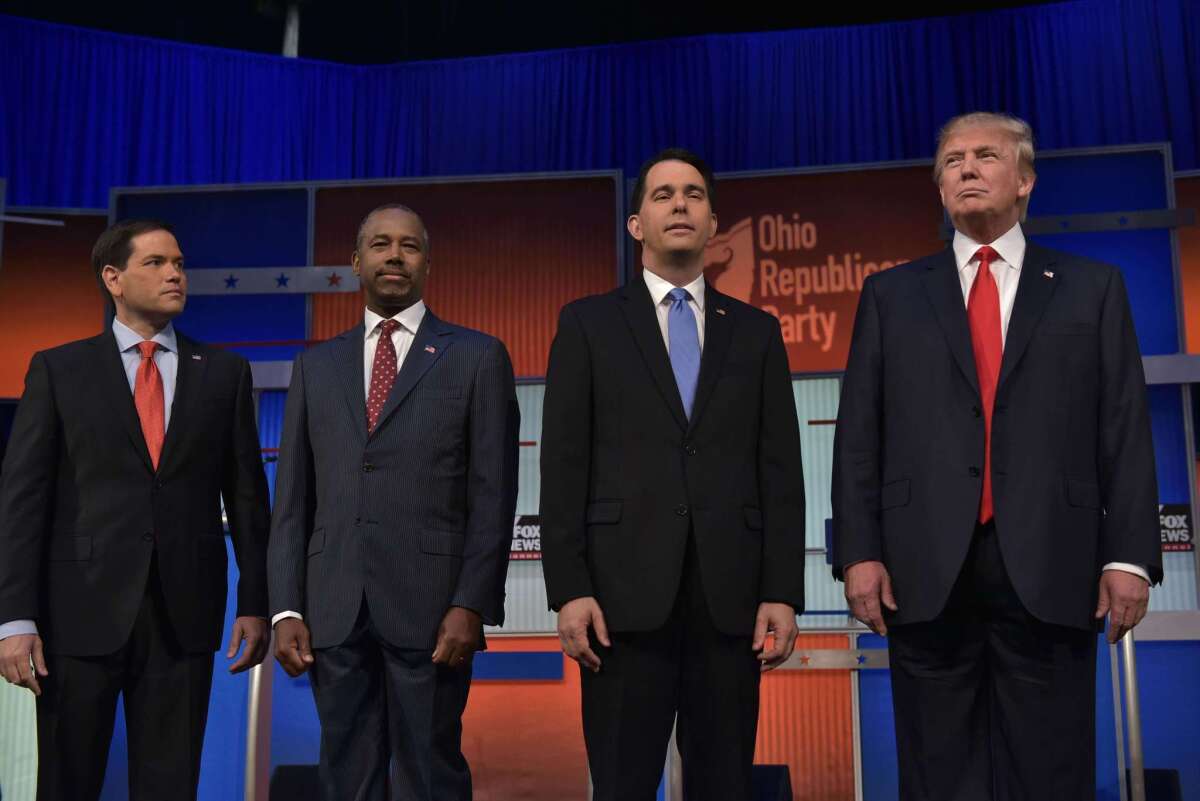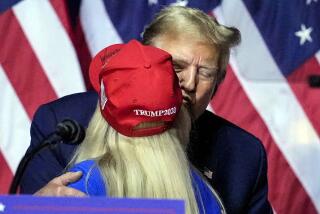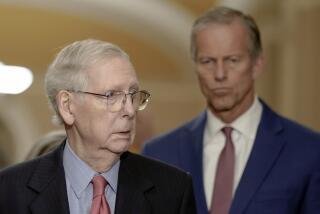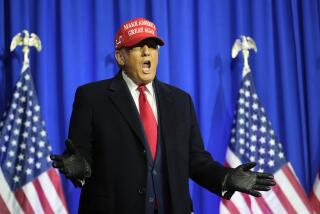Column: Blowhard or no, Trump has shaken up the GOP policy debate

Marco Rubio, Ben Carson, Scott Walker and Donald Trump return to the stage following a break in the Republican presidential primary debate in Cleveland on Aug. 6.
Say what you like about Donald Trump: He’s a blowhard, a braggart and not remotely qualified to be president — all true. But Trump can claim at least one substantive achievement on his improbable way to the top of the polls in the Republican presidential race: He’s broadened the GOP’s internal policy argument, and not only on immigration.
Take foreign policy, the main subject for Wednesday’s debate at the Ronald Reagan Presidential Library in Simi Valley. Unlike most of the other candidates, Trump has said he wouldn’t scrap the nuclear deal President Obama just negotiated with Iran. “We have a contract,” he has said, “a really bad contract.” Instead of abrogating the pact, he’d renegotiate — just as he has done in the realm of real estate.
Or take trade policy. Trump says he opposes the 12-nation Pacific Rim agreement with Asia that Obama is trying to conclude; he says it’s “a disaster” that would “send even more jobs overseas.” Most other GOP candidates have endorsed the pact.
Trump has problems with corporate behavior, too. He says he’d slap financial penalties on American companies that move jobs to other countries; and he thinks many CEOs are paid too much. “It’s a shame and it’s disgraceful,” he said this week — but added: “It’s very hard if you have a free enterprise system to do anything about that.” Other candidates haven’t gone there.
Moreover, Trump says he’d lower income tax rates for most taxpayers, but raise them on the hedge fund managers who have been allowed to pay the lower capital gains rate on their earnings — originally a Democratic proposal. Of the other candidates, only Jeb Bush, of all people, has followed suit.
Granted, Trump isn’t necessarily consistent. In the space of a single interview last month, he said he could support a single-rate “flat tax” or a consumption-based “fair tax” — just as long as any reform preserved the principle of progressive taxation, under which the rich pay at a higher rate. (He didn’t seem to notice the contradiction.)
That doesn’t add up to a coherent program — or a conservative one, as plenty of orthodox conservatives have pointed out. Instead, it’s a quirky billionaire’s off-the-cuff version of right-wing populism.
But it’s not fair to charge that Trump is running a content-free campaign; he’s not. Most of the media attention he’s received has focused on his insults, aimed at everyone from Mexican immigrants to Carly Fiorina. Amid the braggadocio, however, he’s also opened the doors to a much wider debate on economic policy than the GOP would otherwise have indulged.
That’s one reason Wednesday’s debate on CNN may be even more interesting than the one broadcast by Fox News a month ago: Trump and others have more policies to defend. That first debate was bursting with personality but light on substance; most of the candidates were, in effect, introducing themselves to voters for the first time, and stuck closely to their autobiographical talking points. This time, they have no excuse to avoid mixing it up — and pointing out where their rivals are wrong.
In that spirit, here are questions I hope the moderators will ask — on taxes, trade and foreign policy:
Trump and Bush have said everyone’s taxes should go down, but that the wealthy should pay a greater share of total income taxes. Do you agree?
Bush has also said more lower-income families should pay no income taxes at all — arguing, in effect, that the 47% of nontaxpayers Mitt Romney complained about should be enlarged. Do you agree?
Are you for or against the Trans-Pacific Partnership, the trade agreement Trump has denounced as a disaster? If you’re for it, what would you do to protect American workers from seeing their jobs move overseas?
If you want to renegotiate the nuclear agreement, how would you force Iran and other countries to go along? Would you impose U.S. sanctions on European and Chinese companies that did business with Iran?
In the war against Islamic State, Bush, Trump and Wisconsin Gov. Scott Walker have called for U.S. troops to engage in combat on the ground; other candidates have opposed that idea. Discuss.
The candidates have also split over whether the U.S. should accept more refugees from Syria. Trump, Bush, Florida Sen. Marco Rubio and Ohio Gov. John Kasich have said yes; neurosurgeon Ben Carson, Texas Sen. Ted Cruz, Walker and Fiorina have said no. Does the U.S. have a moral responsibility here?
And a bonus question for all the candidates — especially Cruz, who has cast himself as a true conservative, but also praised Trump in an apparent effort to inherit his supporters: Which of Donald Trump’s views do you consider the most wrongheaded?
Twitter: @doylemcmanus
Follow the Opinion section on Twitter @latimesopinion and Facebook
More to Read
A cure for the common opinion
Get thought-provoking perspectives with our weekly newsletter.
You may occasionally receive promotional content from the Los Angeles Times.







